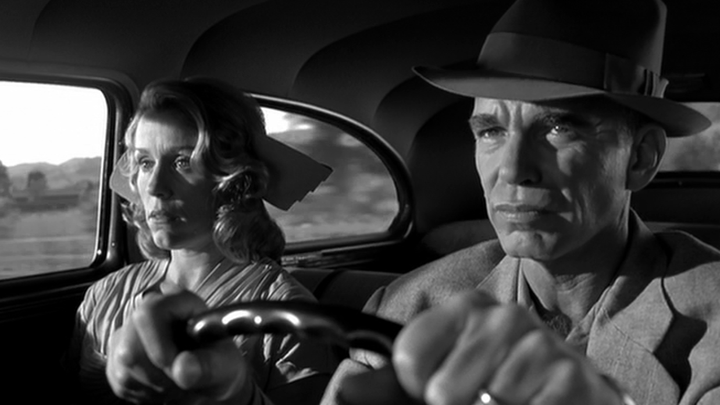In The Man Who Wasn’t There, the Coen brothers’ 2001 homage to the Film Noir genre, the protagonist Ed is tempted from his dull life into making a morally sketchy choice. From that moment, events snowball. Ed is tossed into a series of steadily worsening circumstances and decisions, until the end finds him on death row.
This is a common theme in Noir: the one fateful moment of weakness that leads to a maelstrom of deceit, violence, terror, and despair.
One day I was reflecting on my tendency to automatically say “no” whenever life offers me an opportunity which seems “too good”: too decadently tempting. Too rich. Too sinfully delightful.
And I realized: I do this because when I’m put in this position, I imagine myself to be at the cusp of one of those Film Noire choices. I imagine myself to be at the top of a steep slide into darkness. I visualize myself looking back, ashamed, anguished, regretful, wishing: if only I hadn’t made that one bad call. I should have known it was too good to be true.
So many of our popular stories frame life in this style. There are fateful decision moments, and our choice in those moments will shape the rest of our lives. Often, we give the choice a moral character.
This style is reinforced by the fact that we tell our own stories in reverse this way. How many stories of “successful” people have you read that emphasized one essential choice they made that set them on the path to glory? How many tales of ruined lives have you read that start with one moment of weakness: dropping out of school, trying a drug, saying yes to a one-night stand?
The religious context I grew up in emphasized the “fateful choice” model to its very core. Eve chose to bite the apple, and now we have war and poverty and constipation.
I have a partner now whose default answer is to say “yes!” to things. And it’s been rubbing off on me. And what I’ve realized is:
Life doesn’t actually have downward (or upward!) spirals unless we willingly participate in them. The truth is, a lot of stuff happens. There’s no moral arc to life.
An opportunity is just one opportunity. Not a seat on a one-way rollercoaster to hell. You can get off anytime if you don’t like the way things are headed.
I also realized that it’s really easy to use the Noir expectation to justify living a small life and never taking chances. Never doing things that scare you. You can tell yourself you’re just being “prudent”. You can even shore up your confidence by judging anyone who does take a risk.
To be sure, some opportunities are offered in bad faith: maybe exercise some caution with that email promising to split a $9,000,000 inheritance with you.
And sometimes what you do can have longstanding repercussions. So exercise some caution. Have trusted friends who can give you an outside perspective. Designate a driver. Check on the condom periodically.
But even when shit goes wrong and you’re stuck with consequences: it’s just one thing that happened. It’s not the universe punishing you. It’s not Doom. It’s just life.
Life isn’t a series of pass/fail purity tests. It’s not a prank show. The most likely outcome of saying “yes!” in any given scenario isn’t disaster and it isn’t salvation. The most likely outcome is: life goes on, and now you have a new story to tell.

Agreed on all counts. I don’t think my brain frames things in the noir genre as yours might have done–(Mine is sort of reverse terminator universe perspective–i.e. that I expected the world to crash and burn and that it’s AMAZING that my life is not that of someone just barely scraping by hunting for rats in a post-apocalyptic wasteland–and I think of this every day..)–but I think your point about the lack of grandios “moral arcs” and that choices have consequences–but that’s just normal and it will go on–is SPOT FUCKNG ON.
Good work. :)